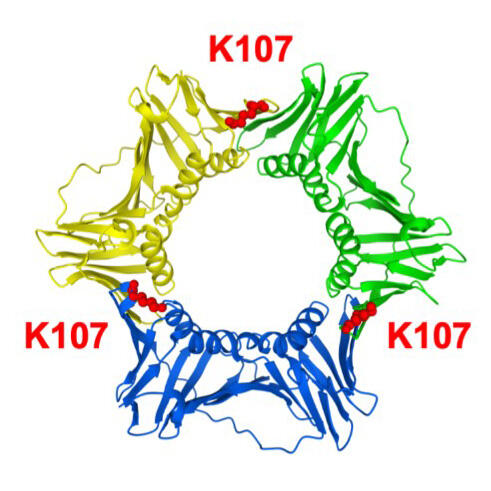In hereditary breast and ovarian cancer (HBOC) syndrome, genes that act on DNA homologous recombination are mutated, leading to chromosomal abnormalities at a high frequency and the development of cancer with high morbidity rates. Homologous recombination is known to be important for maintaining chromosome stability and suppressing carcinogenesis, but it has not been clarified how chromosomal abnormalities, which are the direct cause of diseases, occur.
The research group of Associate Professor Takuro Nakagawa, graduate student Jie Su (doctoral course student), and colleagues of the Graduate School of Science at Osaka University found that ubiquitination of the PCNA protein by the ubiquitinating enzyme Rad8 induces chromosomal abnormalities.
The research group established a method to determine the frequency of gross chromosomal rearrangements and the structure of the abnormal chromosomes using an organism called fission yeast. Previously, they showed that the homologous recombination factor Rad51 suppresses partial chromosomal deletions and translocations mediated by DNA repeats at centromeres." In the present study, they revealed that ubiquitination of the PCNA protein at lysine 107 by the ubiquitinating enzyme Rad8 (an equivalent to HLTF found in humans) is involved in chromosomal translocation. The lysine 107 is located at the interface between PCNA proteins, suggesting that the ring structure of the PCNA homotrimer is important for chromosomal abnormalities.
This study showed that PCNA is involved not only in DNA replication, repair, and recombination but also in gross chromosomal rearrangement. These findings are expected to lead to the development of therapeutic agents for hereditary diseases, such as cancer induced by chromosomal abnormalities and were published in PLOS Genetics.

Credit: Osaka University
Associate Professor Nakagawa said, "We successfully revealed a part of the molecular mechanism of chromosomal rearrangement. By carefully analyzing a ubiquitinating enzyme and its substrate as well as mutant strains of various factors, we presented genetic evidence that ubiquitination of lysine 107 of the PNCA protein induces chromosomal rearrangement. 'How does ubiquitination of PCNA cause chromosomal rearrangement?' We now have a new question to investigate in the future."
This article has been translated by JST with permission from The Science News Ltd.(https://sci-news.co.jp/). Unauthorized reproduction of the article and photographs is prohibited.




